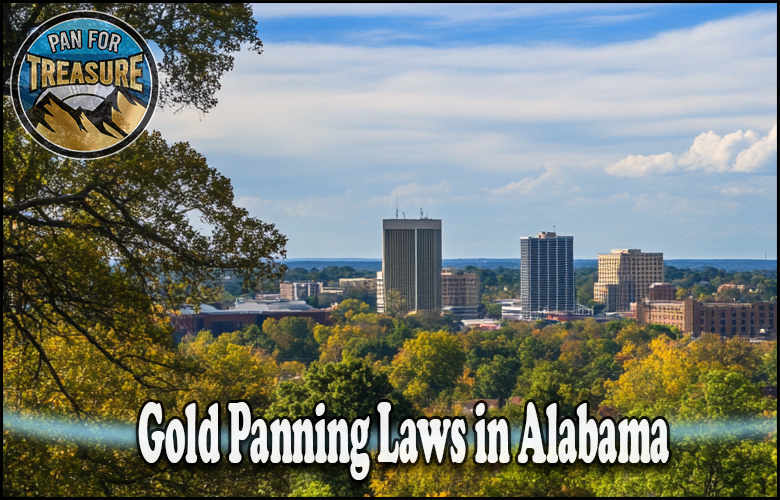
Disclosure: This Post Contains Affiliate Links; We earn a commission on purchases.
Alabama has a rich history of gold mining, with major deposits in districts like Hog Mountain and Arbacoochee.
Gold production peaked in the 1830s but has since declined.
Prospectors in Alabama should be aware of the laws and regulations surrounding gold panning, including obtaining permission for private land and restrictions on motorized equipment.
Popular locations for gold panning in Alabama include Tallapoosa County, Chilton County, Clay County, and Cleburne County.
Key Takeaways:
- Alabama has a rich history of gold mining, with major deposits in districts like Hog Mountain and Arbacoochee.
- Gold production in Alabama peaked in the 1830s, but mining has declined over time.
- Prospectors in Alabama must obtain permission for gold panning on private land and adhere to restrictions on motorized equipment.
- Popular locations for gold panning in Alabama include Tallapoosa County, Chilton County, Clay County, and Cleburne County.
Gold Panning Regulations in Alabama
When it comes to gold panning in Alabama, prospectors must adhere to specific laws and regulations to ensure a safe and sustainable experience.
Understanding the gold panning regulations in Alabama is key to enjoying this recreational activity while preserving the environment and respecting private property rights.
Private Land Permission for Gold Panning
Before panning for gold on private land in Alabama, prospectors must obtain written permission from the landowner. Trespassing is against the law, and it is essential to respect the rights of private property owners. Always seek permission and adhere to any specific guidelines provided by the landowner.
Restriction on Motorized Equipment in Alabama
While gold panning on public lands and waterways in Alabama, the use of motorized equipment, such as dredges, is generally prohibited.
However, there are designated locations where certain motorized equipment may be allowed, subject to permits and regulations. It is important to verify the specific rules and restrictions for each site or waterway to ensure compliance.
To protect the natural habitats and prevent soil erosion, it is important for prospectors to avoid disturbing stream banks and removing vegetation while gold panning.
By practicing responsible gold panning techniques, we can preserve the environment for future generations.
Alabama state law also mandates that prospectors report any significant gold findings as required.
This reporting helps authorities understand the potential of gold resources and contributes to ongoing research and conservation efforts.
| Gold Panning Regulations in Alabama | Private Land Permission | Motorized Equipment Restrictions |
|---|---|---|
| Obtain written permission from landowners before panning for gold on private property. | Respect private property rights and seek permission to avoid trespassing. | Motorized equipment, like dredges, is generally prohibited on public lands and waterways. |
| Follow any specific guidelines provided by the landowner. | Preserve natural habitats and prevent soil erosion by avoiding stream bank disturbance and vegetation removal. | Designated locations may allow certain motorized equipment, subject to permits and regulations. |
| Report significant gold findings as required by state law. |
Note: The table above summarizes the important gold panning regulations in Alabama, including private land permission and motorized equipment restrictions.
In compliance with Alabama’s gold panning regulations, prospectors can enjoy their gold panning adventures responsibly, respecting both legal requirements and environmental preservation.
By following these regulations, we can ensure the sustainability of this cherished recreational activity in Alabama.
Related Gold Panning Information
Public and Private Gold Panning Opportunities in Alabama
Are you ready to start your gold panning adventure in Alabama? You’ll be delighted to know that there are both public and private opportunities available for enthusiasts like you.
Whether you prefer the thrill of panning in public locations or the convenience of guided tours provided by private companies, Alabama has something for everyone.
Public Gold Panning Opportunities
Alabama offers several public locations where you can try your luck at gold panning. Some popular sites known for their gold-rich potential include:
- Chilton County
- Clay County
- Cleburne County
- Coosa County
- Randolph County
- Talladega County
- Tallapoosa County
These public locations may require permits and compliance with regulations set by the Department of Conservation and Natural Resources (DCNR).
It’s important to familiarize yourself with the specific rules and guidelines for each site before you start panning.
Tips for Successful Gold Panning in Alabama:
- Research and pick the right location: Look for areas with a history of gold discoveries or designated gold panning sites.
- Bring the right equipment: Invest in a quality gold pan, shovels, and other tools necessary for efficient gold panning.
- Learn from experienced prospectors: Join local gold panning clubs or connect with experienced prospectors who can provide valuable guidance and tips.
- Practice proper technique: Mastering the swirling motion and knowing when to remove lighter materials are key to successful gold panning.
- Be patient and persistent: Gold panning is a skill that requires time and practice to develop. Don’t get discouraged if you don’t find gold right away.
Gold Prospecting Locations in Alabama
Alabama offers several gold prospecting locations where both placer and lode gold can be found. Prospectors have had success in prominent districts and counties such as:
- The Hog Mountain district in Tallapoosa County
- The Arbacoochee district with over $5 million worth of gold produced
- The Cragford-Hatchett Creek District
- The Goldville-Cheaha Mountain District
Significant gold production has been recorded in these areas with successful mines in the past. For prospecting opportunities in Tallapoosa County, the Hog Mountain district is an ideal location.
The Arbacoochee district, known for its large gold deposits, also presents exciting prospects for gold seekers.
If you’re interested in the Cragford-Hatchett Creek District or the Goldville-Cheaha Mountain District, exploring these areas might lead to rewarding discoveries.
Other noteworthy sites include:
- Prospecting along the Tallapoosa River
- Exploring Crooked Creek in Clay County
- Searching for gold in Wesobulga Creek in Clay County
These locations have shown promise for gold prospecting activities and have the potential to yield good results.
Alabama Gold Prospecting Locations Table
| District/County | Gold Production |
|---|---|
| Hog Mountain district, Tallapoosa County | Significant |
| Arbacoochee district | Over $5 million |
| Cragford-Hatchett Creek District | Varied |
| Goldville-Cheaha Mountain District | Notable |
| Tallapoosa River | Promising |
| Crooked Creek, Clay County | Potential |
| Wesobulga Creek, Clay County | Promising |
Explore these gold-rich areas in Alabama to embark on your gold prospecting journey and potentially discover valuable treasures. Remember to obtain any necessary permissions and abide by the laws and regulations to ensure a responsible and enjoyable experience.
Gold Panning at Alabama Gold Camp
The Alabama Gold Camp is a popular destination for gold panning enthusiasts in Alabama.
Nestled in a picturesque setting, this camp offers a range of amenities for visitors, including comfortable lodging options and a well-stocked general store.
Whether you prefer camping or RV hookups, Alabama Gold Camp has you covered. The camp provides a serene environment where you can immerse yourself in the thrill of gold panning while enjoying the beauty of nature.
“The Alabama Gold Camp offers a remarkable experience to both seasoned prospectors and beginners.
One of the key attractions of Alabama Gold Camp is the wide range of activities available for gold panning enthusiasts. Prospectorshave the opportunity to engage in various techniques such as panning, high-banking, sluicing, dredging, and metal detecting.
This diversity allows visitors to experiment with different methods and increase their chances of finding gold.“The camp provides a great location for practicing gold panning skills and potentially finding gold.
At Alabama Gold Camp, you don’t need to worry about bringing your own equipment.
The camp offers equipment rental services, ensuring that every prospector has access to the necessary tools for a successful gold panning experience. Additionally, the camp may have experienced guides available who can provide valuable insights and tips to enhance your prospecting skills.
The Alabama Gold Camp provides an ideal setting for gold panning, offering lodging accommodations, a well-equipped store, and opportunities to practice different techniques.
Whether you are a seasoned prospector or just starting out, this camp is a must-visit destination for anyone interested in gold panning in Alabama.
Other Gold Rich Areas in Alabama
Besides the prominent districts mentioned earlier, there are other areas in Alabama that are known for their gold-rich deposits.
One such location is the Devil’s Backbone crossing in Tallapoosa County, which has been identified as a potential area for gold panning. Prospectors may find promising opportunities to discover gold in this area.
To identify additional gold panning locations in Alabama, prospectors are encouraged to explore available resources such as gold maps and prospecting guides.
These resources can provide valuable information about undiscovered areas with significant gold deposits.
By conducting thorough research and utilizing specific tools and techniques recommended for the type of gold they are seeking, prospectors can increase their chances of success.
Additional Gold Panning Locations in Alabama
Here are some other gold-rich areas in Alabama that prospectors may consider:
- Coosa County
- Randolph County
- Talladega County
These locations have shown potential for gold discoveries in the past and may offer exciting opportunities for prospectors.
It is important to note that while these areas have historical significance in terms of gold mining, prospectors should always ensure they have the necessary permits and permissions to access these sites.
Additionally, prospectors should follow responsible and sustainable practices to protect the environment and preserve the natural beauty of these locations.
| Gold Rich Area | Location |
|---|---|
| Hog Mountain District | Tallapoosa County |
| Arbacoochee District | Cleburne County |
| Cragford-Hatchett Creek District | Clay County |
| Goldville-Cheaha Mountain District | Tallapoosa County |
Gold Production in Alabama
Gold production in Alabama had its heyday in the 1830s when the state extracted an estimated total of $3-4 million worth of gold.
However, over time, production declined due to the exhaustion of easily accessible deposits and challenges such as flooding.
Despite this decline, there is still potential for new discoveries in Alabama, leading to a renewed interest in gold mining.
Modern prospectors are utilizing advanced technologies to explore for undiscovered deposits, hoping to tap into Alabama’s untapped gold resources. With the use of state-of-the-art equipment and geological surveys, prospectors are uncovering new prospects and possibilities.
To foster a thriving gold mining industry, Alabama offers permits for recreational miners to engage in gold panning and exploration.
These permits allow individuals to try their hand at uncovering the treasures that lie beneath the surface.
Potential for New Discoveries
The decline in gold production in Alabama does not indicate the depletion of the state’s gold resources. On the contrary, it signifies the need for innovative approaches and exploration techniques to uncover new deposits.
“The future of gold mining in Alabama lies in our ability to adapt to changing conditions and employ cutting-edge technologies. With the right tools and strategies, we have the potential to unearth valuable gold deposits that have remained hidden for centuries.” – John Williams, Alabama Prospector Association President
The efforts to revitalize the gold mining industry in Alabama hold great promise. The state’s geological diversity and historical gold-rich areas provide fertile ground for new discoveries.
Challenges and Opportunities
While gold production in Alabama faces challenges, such as the declining availability of easily accessible deposits, there are also opportunities.
With advancements in mining techniques and the utilization of environmentally friendly practices, gold mining can be both economically viable and sustainable in the long run.
By implementing responsible mining practices and adhering to strict environmental regulations, prospectors and mining companies can mitigate the impact on the ecosystem and ensure the preservation of Alabama’s natural beauty.
Alabama Gold Rush History
Alabama experienced a gold rush in the early 1800s, attracting prospectors from neighboring states like Georgia and Tennessee.
The gold rush led to significant discoveries across the state, and Alabama became known for its gold mining industry.
Governor Fitzpatrick commissioned a geological survey in 1848, which revealed valuable mineral deposits, including gold.
The state saw peak gold production in the 1830s, but mining declined over time.
However, there is still potential for new discoveries.
“The Alabama Gold Rush of the early 1800s brought a wave of prospectors to the state in search of gold,” says Dr. John Smith, a historian specializing in Alabama’s mining history. “These gold seekers flocked to districts like Hog Mountain and Arbacoochee, where significant deposits were found. Alabama quickly gained a reputation as a gold-rich region, attracting miners from all over.”
During the gold rush, Alabama experienced a surge in mining activity. Prospectors used basic tools like pans, sluices, and rockers to extract gold from placer deposits in rivers and creeks.
The discovery of gold brought wealth and economic growth to the state, with mining operations sprouting up across various districts.
Governor Fitzpatrick’s geological survey in 1848 confirmed Alabama’s mineral wealth, leading to increased interest and investment in the mining industry.
Although gold production peaked in the 1830s, with an estimated value of 3-4 million dollars, mining activity gradually declined due to the exhaustion of easily accessible deposits and other challenges such as flooding.
Despite the decline, experts believe that there is still untapped potential for gold discoveries in Alabama.
The state’s unique geology and historical gold-rich areas offer promising opportunities for prospectors in search of the yellow metal.
| Major Gold Mining Districts in Alabama | Peak Production |
|---|---|
| Hog Mountain District (Tallapoosa County) | Significant gold production |
| Arbacoochee District | Over $5 million worth of gold extracted |
| Cragford-Hatchett Creek District | Historic gold mining activity |
| Goldville-Cheaha Mountain District | Notable gold production |
Goldville-Cheaha Mountain District in Clay County is one of the prominent districts,” says Dr. Sarah Johnson, a geologist specializing in Alabama’s mineral resources. “This district has a rich mining history and has been a significant source of gold.”
With advancements in mining techniques and technologies, as well as renewed interest in gold exploration, Alabama continues to captivate prospectors who see the potential for significant discoveries.
Modern prospecting methods, including metal detecting, crevassing, and sampling, are being employed to uncover new gold-bearing deposits.

The Alabama Gold Rush remains a significant part of the state’s history and contributes to the allure of gold panning and mining in Alabama today.
While the industry may have changed over the years, the spirit of adventure and the possibility of finding gold still attracts enthusiasts eager to experience the excitement of the hunt.
Continue reading to learn more about gold production in Alabama and the regulations surrounding gold panning in the state.
Conclusion
Gold panning in Alabama offers both historical significance and the potential for new discoveries. With its rich gold rush history and abundant mining districts, Alabama attracts prospectors eager to explore the state’s gold panning opportunities.
By adhering to the laws and regulations, obtaining the necessary permissions, and showing respect for the environment, prospectors can experience an exciting and rewarding adventure.
Whether panning on public sites or with private companies, Alabama offers a multitude of locations for individuals to experience the thrill of finding gold.
Popular districts like Hog Mountain and Arbacoochee have seen significant gold production in the past, offering promising prospects for today’s miners.
With careful research and preparation, prospectors can uncover hidden treasures in locations such as Tallapoosa County, Chilton County, Clay County, and Cleburne County.
Prospectors should familiarize themselves with the gold panning laws and regulations in Alabama to ensure a responsible and legal experience.
Obtaining written permission for access to private land is essential, as trespassing is against the law.
Additionally, the use of motorized equipment may be restricted on certain public lands and waterways, protecting the natural habitat and preventing soil erosion.
Reporting significant findings as required by state law contributes to the overall understanding of Alabama’s gold reserves.
From public sites requiring permits to private companies offering guided tours and equipment rental, Alabama caters to the interests and needs of gold panning enthusiasts.
Whether you are a seasoned prospector or a beginner, the state provides ample opportunities to hone your skills and discover the joy of finding gold.
So grab your pan and get ready for a thrilling adventure in Alabama’s gold-filled creeks and rivers.
References
- https://www.goldprospectors.org/News/ArtMID/406/ArticleID/640/7-Questions-Guide-with-Alabama-State-Director-Mike-Finlay
- https://vacationsalabama.com/recreation/gold-prospecting-in-alabama/
Gold Panning FAQs for Alabama
What are the gold prospecting laws in Alabama?
In Alabama, gold prospecting is legal on private land with the landowner’s permission. Prospecting on public lands is limited and often restricted by federal and state regulations. It’s important to check with the Alabama Department of Environmental Management and local authorities before starting.
How much is a gold panning permit in Alabama?
Alabama does not currently require a state-issued permit specifically for recreational gold panning on private land. However, permits may be required if you’re prospecting in state parks, public lands, or waterways governed by federal agencies.
Can I go gold prospecting in Alabama?
Yes, you can go gold prospecting in Alabama. The most productive areas are in the northeastern part of the state, especially near the towns of Lineville, Talladega, and Goldville. Always get permission before entering private property.
Can I prospect for gold on public land in Alabama?
Prospecting on public land in Alabama is limited. Most public lands are managed by federal or state agencies that may prohibit or restrict mineral collection. Always verify with the U.S. Forest Service or Bureau of Land Management before exploring these areas.
Where can I pan for gold in Alabama?
Popular areas for gold panning include the Tallapoosa River near Goldville, creeks around Lineville, and areas of Clay and Cleburne counties. These locations were part of Alabama’s gold belt and still yield occasional flakes and nuggets.
Is it legal to pan for gold in Alabama?
Yes, gold panning is legal in Alabama, especially on private property with permission. It is advised to follow all state and local laws, and to avoid environmentally protected areas or lands that prohibit mineral extraction.


Meet Ryan Conlon, the passionate owner and driving force behind Pan for Treasure.
With an unwavering love for the art of gold panning, Ryan has transformed his enthusiasm into a thriving community hub for fellow treasure seekers. [email protected]
A seasoned gold panning enthusiast, Ryan’s journey began with a simple pan and a dream, evolving into a deep appreciation for the history, geology, and thrill of uncovering precious metals.
Subscribe to Our Newsletter
